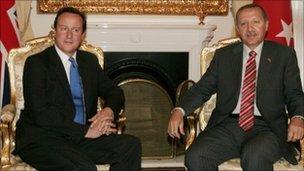David Cameron sees only delight in closer Turkish ties
- Published

Mr Cameron believes Turkey's economic and political clout will only continue to rise
If clocking up air miles were a measure of how to make a political impact, then David Cameron would be scoring highly.
As other MPs are packing their bags for their holidays, he and his cabinet colleagues are preparing for a trip of a very different kind.
Not content with visits to France, Germany, Afghanistan and the Obama White House in his first few months of governing, this week the prime minister is travelling to two countries he believes are growing in global importance - eager that the UK should cultivate closer ties.
On Tuesday, the Prime Minister is on parade in Turkey, where he'll promise to fight to help the Turkish bid to become a member of the European Union.
EU talks
Despite becoming a candidate for membership five years ago, talks have stumbled.
Britain has traditionally been a stronger backer of Turkey's ambition than other EU countries.
Mr Cameron is expected to acknowledge this, in an apparent swipe at the attitudes of other countries, notably France.
He will allude to General De Gaulle's stance on Britain joining the EU saying, "we know what it is like to be shut out of the club".
So why make the case? Turkey's position on the map alone explains some of Mr Cameron's eagerness to draw the country closer.
Geographic importance
With Europe to the West, and borders with Iran and Iraq too, the prime minister will argue that Turkey's geographic position gives it "unrivalled influence" facing both East and West.
Turkey has the second biggest army in Nato, and has been an important ally in the war in Afghanistan.
Despite a recent sharp spat with Israel over the raid on the Gaza flotilla, Turkey has an important role as a broker in the region, having worked to bring an end to disputes between Israel and Syria.
And with its young population of more than 70 million, Turkey's economy is surging, and its growth is expected to outpace India, where the PM is heading after Turkey, by 2017.
It is also an important junction for oil and gas pipelines heading West.
So for economic and political reasons, the appeal of a closer friendship between Turkey and the UK is obvious. But there are potential pitfalls.
Turkey cannot join the EU until it is ready to establish full diplomatic ties with Cyprus. Its failure to do so is one reason why membership talks have stuttered.
And Turkey recently voted against new UN sanctions with Iran.
Despite that, David Cameron seems determined to make the case for closer British ties to Turkey.
But his strong support cannot remove all the obstacles that hold the country back from becoming a full member of the European club.